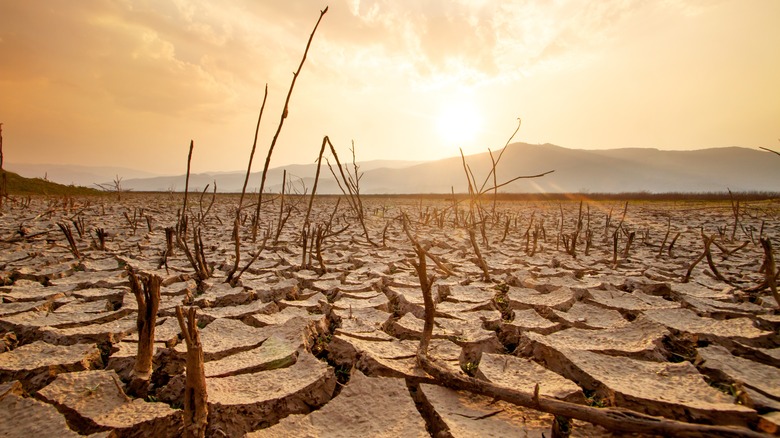Nostradamus' Chilling Predictions For 2024
Some of the greatest poets of all time, such as Walt Whitman and William Blake, are described as "visionaries" for the images they are able to convey and imprint on the reader's memory. But few poets are said to predict the future in the visions they share. Except for Nostradamus, whose predictions remain of great curiosity to modern people nearly five centuries after the poet and oracle's death in 1566.
During his lifetime, Nostradamus was known as a plague doctor and an astronomer in his native France. But his name is famous around the world thanks to the publication of 1555's "Les Prophéties," a vast collection of hundreds of four-line verses or quatrains (also known as his "Centuries") that he claimed offered deep insights into the events that would affect humanity up until the year 3797.
Nostradamus' prophecies are incredibly cryptic, and skeptics argue it's easy to interpret his predictions as if he correctly foresaw certain events. Indeed, when it comes to his predictions for 2024, it doesn't take too much effort to match his words up to what's already happening on the world stage and to conclude what he thought might happen. Here are four of the 2024 predictions analysts have pulled from his writings.
Climate change will start to bite
Nostradamus' visions of the future are Biblical in their imagery, particularly when it comes to images of the end of the world. And such images, fantastical as they often are, have grown more believable in recent years with the advent of climate change. As noted by several analysts, Nostadamus' earlier quatrains certainly lay the groundwork for a world facing the catastrophic effects of global warming, and 2024 seems to be no different.
Several interpreters of Nostradamus' "Centuries" point to a quatrain describing boiling seas, rivers, and lakes alongside the prediction of a "great drought." They suggest this is evidence that the oracle predicted climate change leading to a greater portion of the earth becoming unlivable for humans and animals. Indeed, scientific consensus claims that rising sea temperatures are harming marine life, meaning that Nostradamus prediction isn't as off the wall as it might first appear. Meanwhile, scientific forecasters such as Smart Rain do indeed predict a drought for 2024, particularly in the Northwestern United States.
A war-torn age
Since the COVID-19 pandemic, global news cycles have been dominated by the outbreak of war. In February 2022, Russia invaded Ukraine, pushing tensions between the superpower and the West to their highest point since the Cuban Missile Crisis. Though Russia seemingly expected their neighbor to fold in a matter of days, with Western backing Ukraine has exhibited remarkable resistance, and the conflict looks unlikely to be resolved anytime soon. In the fall of 2023, Israel declared war on Hamas following a brutal attack on Israeli civilians, leading to intense bombing of the Gaza Strip and thousands of further deaths.
Analysts of Nostranamus' "Centuries" claim that his quatrains predict further conflict for 2024, with the poet specifically envisaging that a huge naval battle will take place. In "Nostradamus: The Complete Prophecies for the Future," Mario Reading highlights a quatrain describing a "calamitous" war that he believes is brought about by two "great" allied powers. Some, including The Jerusalem Post, have claimed that the quatrains point to a confrontation between China and NATO, which — taken in light of Reading's analysis — would suggest the dawn of a new Chinese-Russian pact.
King Charles III's reign will be cut short
The British monarchy lost its long-reigning matriarch, Queen Elizabeth II, in 2022 at the age of 96 (the timing of which The Jerusalem Post claims Nostradamus correctly predicted). While Charles III became the new king at the moment of her death, royal watchers had to wait until May 2023 for his coronation, an opulent affair full of pomp and ceremony as the U.K. celebrated its new monarch and wished him a long reign.
However, despite going through one of the most turbulent periods in living memory, the British royals should expect even more upheaval in 2024, at least according to Nostradamus. Per Mario Reading's "Nostradamus," after the lines predicting a "calamitous war," the quatrain envisions: "Soon afterwards a new King shall be anointed / Who, for a long time, will appease the earth." Some have interpreted this as meaning that Charles will choose to abdicate and make way for a monarch who might enjoy greater longevity, though another quatrain foresees a king being forced from the throne. Though his son Prince William is next in line, some analysts have pointed to the claim that one with "no mark of a king" shall take the throne and suggested it means Prince Harry will assume power (via the Irish Examiner).
A New Pope will wreak havoc
And it's not just the British royal family that is believed to see a momentous change of guard in 2024. According to some sources, the Catholic Church is also going to see a new figurehead emerge. Pope Francis I will turn 88 in December 2024, which makes the prediction appear especially prescient. Arguably, the Pope has served his time — he ascended to the Vatican's highest office in 2013 after the resignation of his predecessor — and it would certainly make sense for him to retire while still able to fulfill his duties as pontiff. The lines highlighted by the Irish Examiner, however, foretell the Pope's death and his replacement by a young Roman. Though arguably, "Roman" in this case refers to the church itself, with the youthful replacement predicted to unleash "acute damage" on the pontificate.
But Catholics need not panic unjustly. The fact is that though Nostradamus is famous for the hundreds of uncanny predictions, they aren't all interpreted the same way, nor assigned to the same time period by analysts. The quatrain highlighted by the Irish Examiner, for example, turns up in Mario Reading's "Nostradamus" too, only this time it is said to relate to 2056. Even in prophecy, it appears nothing is set in stone.




